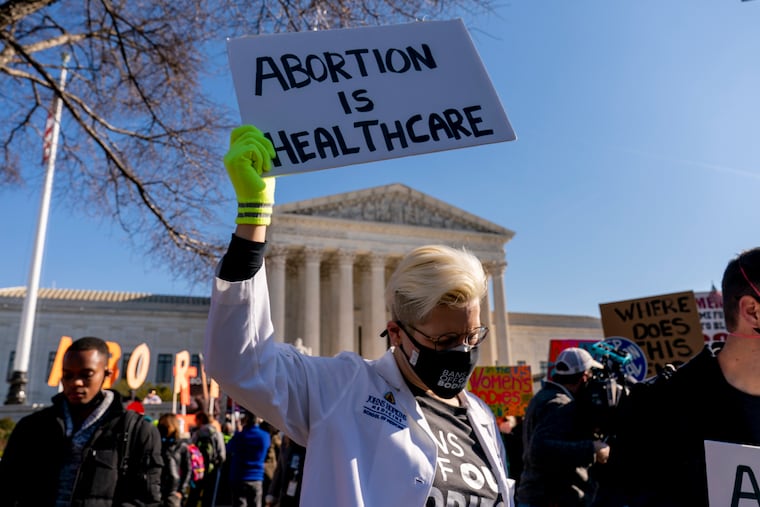Lawsuit shaping the future of abortion in Pa. isn’t the one you think | Editorial
A case challenging a ban on using Medicaid funds to end pregnancies could have wide-reaching implications in the commonwealth.

The battle lines over abortion rights have been drawn nationally. This summer, the Supreme Court of the United States is likely to deliver a blow to Roe v. Wade, the landmark 1973 case that established a federal right to an abortion, when the justices are expected to affirm a ban on abortions after 15 weeks’ gestation that was enacted in Mississippi. But it is a different lawsuit that is shaping the contours of the fight in Pennsylvania.
In 2019, the Women’s Law Project, along with Planned Parenthood and other organizations, sued the Pennsylvania Department of Human Services over the state’s restrictions on using Medicaid funding for abortions.
» READ MORE: How Pa. can protect abortion rights no matter what the Supreme Court decides | Editorial
The impact of the abortion funding ban is enormous: forcing 1 in 4 low-income pregnant people who want a termination to continue with their pregnancies.
The harm is massive. “Being unable to obtain a wanted abortion leads to worse physical health outcomes, challenges for the children in terms of well-being and development, and also more ongoing violence and economic insecurity,” said Sarah Roberts, a researcher at University of California at San Francisco.
Most abortions cost around $450 to $500 in Pennsylvania. The Abortion Liberation Fund of Pa. helps people in the Philadelphia region with financial assistance to cover that cost. According to Elicia Gonzales, the fund’s executive director, this year the fund was able to provide financial support to more than 3,200 people who wanted to terminate a pregnancy — two-thirds of whom were enrolled in Medicaid. Gonzales says the need is even greater: “We run out of money every day.”
Focusing on the prohibitive nature of the cost of abortion is critical from the perspective of reproductive justice. La’Tasha Mayes, founder of New Voices for Reproductive Justice, says that the focus on abortion bans by gestational age ignores the forces that make abortion all-but-banned for some. “A Black woman in Philadelphia, one of the largest impoverished cities in the nation, doesn’t have the same choices as a white woman living in the same city,” Mayes told us. “You have to account for access because there’s no choice if you don’t have access.”
Black, Hispanic, Indigenous, and those of Asian American and Pacific Islander descent in Pennsylvania all participate in Medicaid in significantly higher rates than white people.
» READ MORE: Decades after `Roe,' black women are still denied reproductive justice | Opinion
Taking on the Medicaid ban on abortion is a health and social justice issue — and the litigants in the case are arguing that Pennsylvania’s prohibition violates the state constitution’s Equal Rights Amendment and Equal Protection Clauses.
“What we are seeking in this litigation is a declaration that abortion is a fundamental right protected under the state constitution and the suspension of the ban on Medicaid funding for abortion in Pennsylvania,” said Susan J. Frietsche, senior attorney with the Women’s Law Project.
Having the Pennsylvania Supreme Court declare that there is a right to abortion in the Pennsylvania Constitution would be game-changing if the U.S. Supreme Court reverses Roe. In a post-Roe world the federal courts won’t be a viable avenue to challenge state abortion restrictions, but given a favorable ruling in the Pennsylvania case, state courts could provide remedy — and the liberal tilt of the highest court in the commonwealth could do exactly that.
The effort faces an uphill battle — and the precedent set by a Pennsylvania case from 1985 that upheld the constitutionality of banning taxpayer funding for abortions.
» READ MORE: How the Mississippi Supreme Court case could impact abortion access in Pa. and N.J.
Not waiting for a ruling, Republican lawmakers rolled out a contingency plan that could have a disastrous effect. Last week, in direct response to the lawsuit, Republican State Sen. Judy Ward introduced a constitutional amendment to explicitly state that there is no guaranteed right to abortion — or funding for them — in the state constitution. If the amendment passes the General Assembly in two consecutive terms, it will go to the voters as a ballot question — bypassing the ability of any governor to veto it.
This summer, while the nation waits for a ruling on abortion from Washington, it’s imperative that here in Pennsylvania we keep our eye on the court in Harrisburg. If the state’s Supreme Court strikes down the Medicaid ban, it would be a massive victory for access to abortion — but one that those committed to the right of every pregnant person to control their own body may have to soon defend at the ballot box.